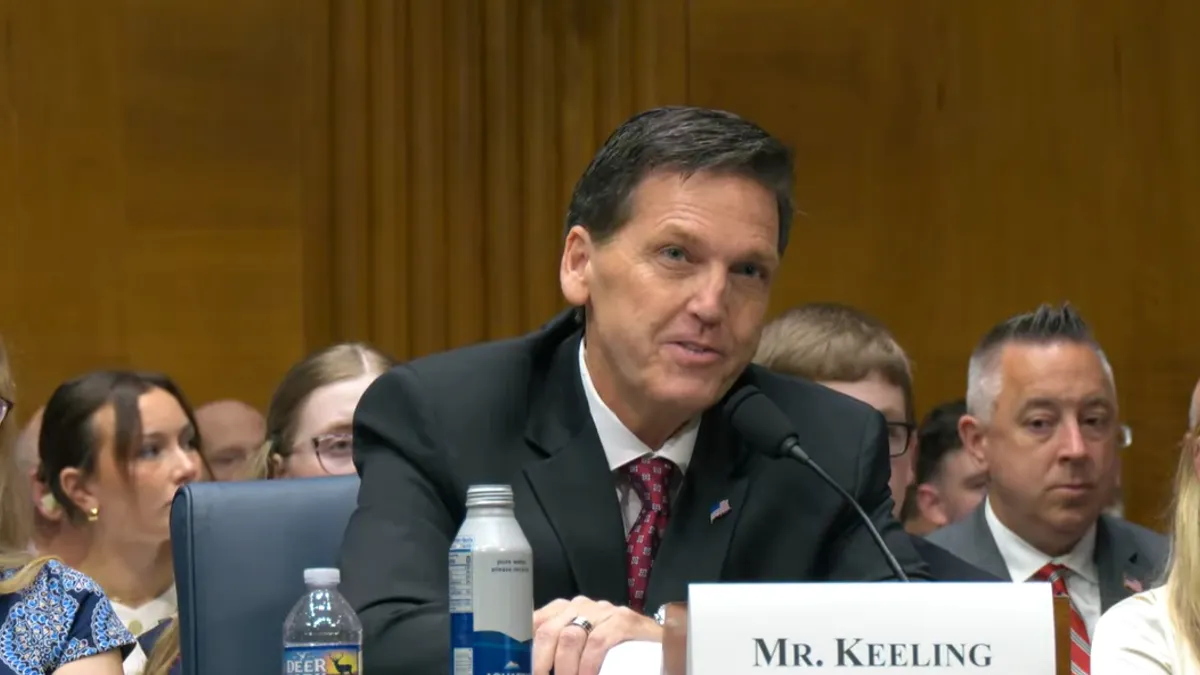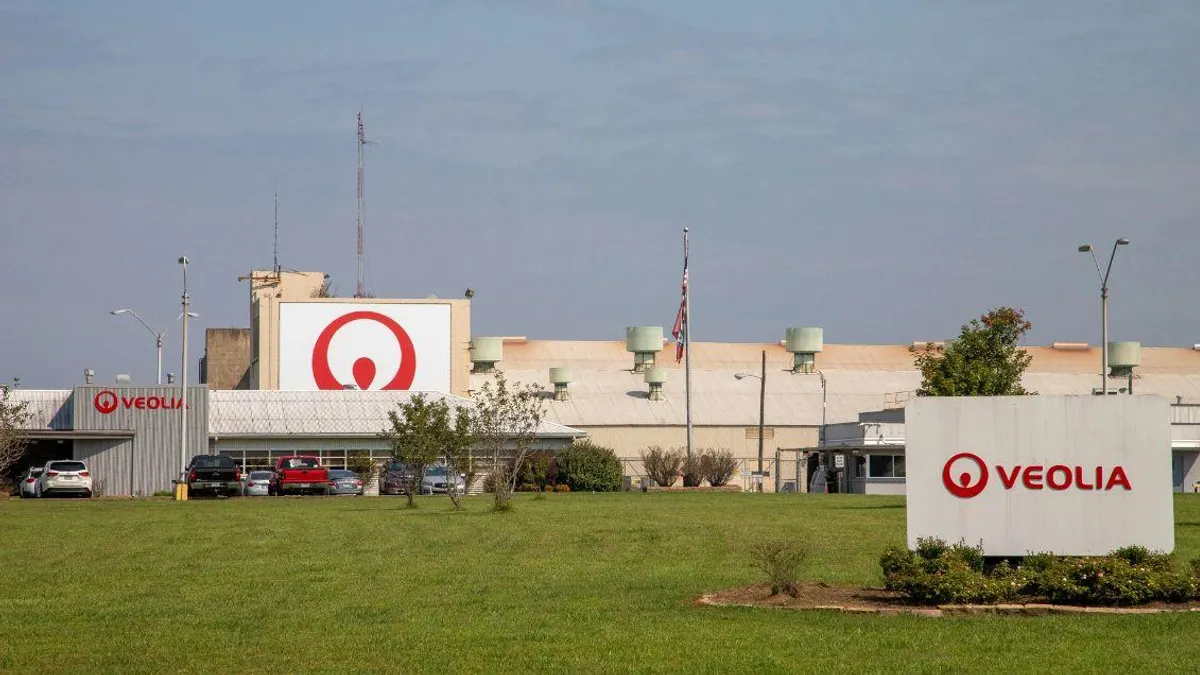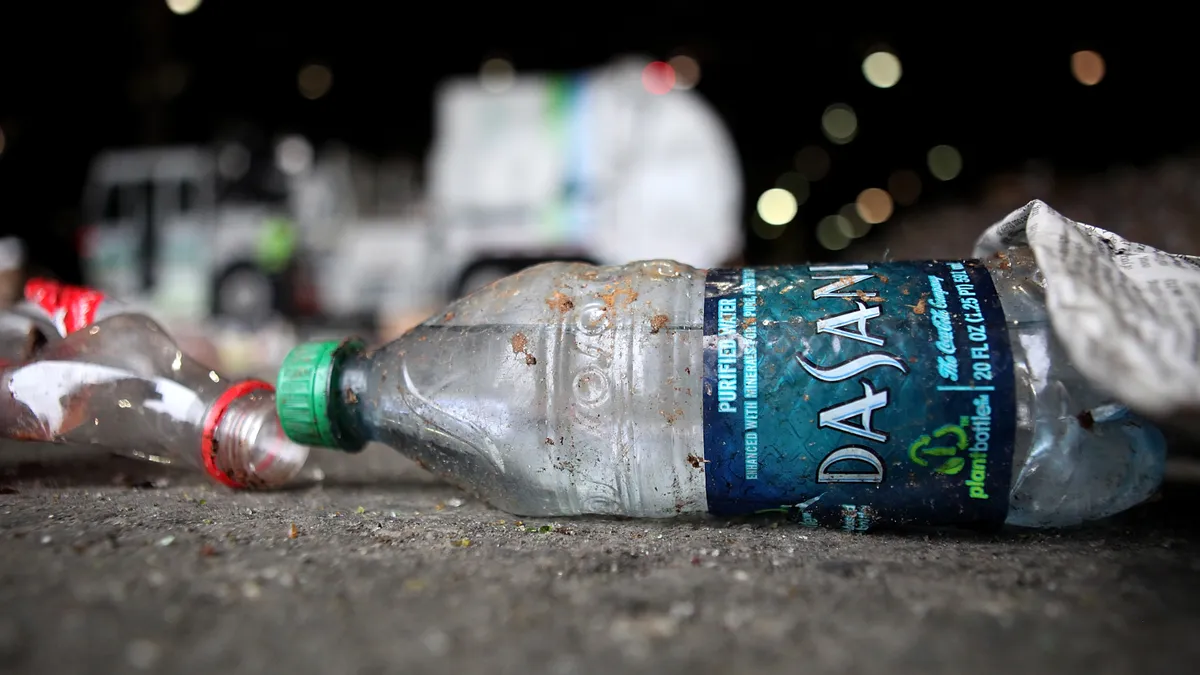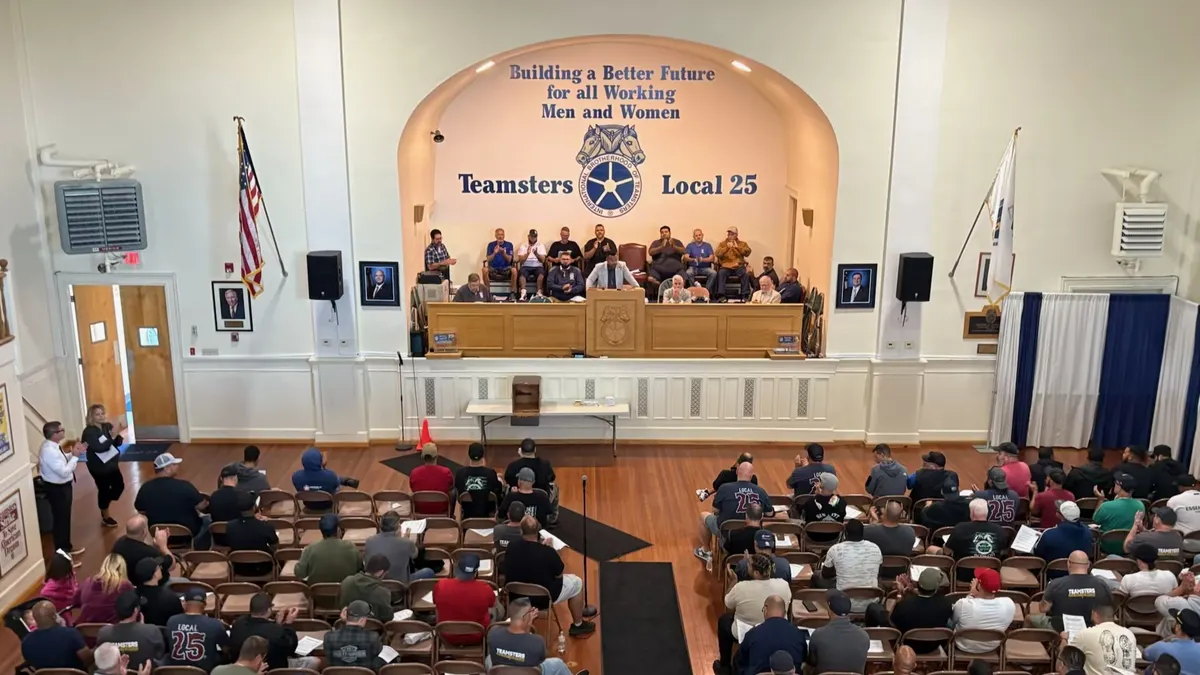Running North America's largest waste and recycling operation has somehow gotten even more complex in the last few months.
Since Waste Dive last spoke to Waste Management CEO Jim Fish in May, the company has reported strong earnings while also coming up against a series of tough tasks. Some, such as the beginning of the Los Angeles commercial waste franchise system and the start of operations at New York's newest marine transfer station, were expected. Others, such as responding to Hurricane Harvey and Hurricane Irma, were not. Then, of course, Chinese trade policy remains a major wild card.
Waste Dive sat down with Fish in Baltimore for updates on all of this — plus robotics, temporary staffing and the search for a chief technology officer.
The following transcript has been edited for brevity and clarity.
WASTE DIVE: What is the latest on Waste Management's response to Irma and Harvey? It seems like there will be months of work ahead.
JIM FISH: You're right. There's months, maybe years, of work ahead. Particularly in South Texas where so many homes were flooded. I thought we responded extremely well. It's right in our wheel house. We're really good at execution and operations. As you can imagine there is a lot of waste. Not only the cleanup, but then the reconstruction. It could be 12 to 18 months before it's all done. I spent some time out helping some of our employees clean out their houses and everything gets ruined. So you really end up with this huge pile of junk and it fills up a truck [after] just one house. You can imagine FEMA's got a huge task on their hands over the next probably four months getting it cleaned up.
I heard there was some collaboration with other companies in the beginning to make sure you could use each other's facilities?
FISH: Exactly, yes. Houston for a while was almost like a series of islands. You couldn't get between parts of the city. So I'd reached out to Ron [Mittelstaedt of Waste Connections], and to Don [Slager of Republic Services]. Ron is right there in Houston and so it made sense to call him. He was fantastic and said, "look if you need office space have your employees come over to our offices, we'll set them up in a conference room." Then we exchanged information on which facilities were open, because not all facilities were open. So for about a week, Don and Ron and I exchanged information.
In your latest quarterly earnings call you said China's new trade policies wouldn't affect Waste Management directly because the business is diversified. Since then, we've heard new concerns from the industry as we learn more and still don't seem to know enough. What are your latest thoughts?
FISH: It's interesting that the government in China and the mills — who tend to be on the same page when they do things like this, and they were when they went through the Green Fence — do not appear to be on the same page here. So that leads me to believe that this is much more policy-driven by the Chinese government than it is economically driven. The mills absolutely need U.S. material. When you think about OCC, for example, it's the best material in the world. So what's happening to these mills right now is that they're doing one of two things. They're either using less preferable material from other parts of the world, or they're using virgin material and the cost of virgin materials is now going through the ceiling. My belief is that this is temporary — and I don't know, I don't have any inside information to say otherwise — but I think this is temporary. But it certainly could affect our business. It could affect all U.S. recyclers and it could affect those Chinese mills.
"The mills absolutely need U.S. material. When you think about OCC, for example, it's the best material in the world."

Jim Fish
CEO, Waste Management
Over the last few years you've restructured some of these recycling contracts to shield yourself from risks. Is that system going to hold up for this or do you see a need to look even deeper at changing the way the financial terms are set?
FISH: No, I think it holds up. What we did was change the contracts so that in good times we're sharing with those producers and when things are tough we ensure for our shareholders that we get a certain margin. So that could come into effect. It's not at this point. Prices have started to drop, but not down to where that kicks in. But it certainly is a protection that we put into place for exactly a situation like this if it continues down the path that it's on right now.
There is also a parallel conversation about the contamination specification of 0.3% and multiple groups are trying to get clarity on that. Everyone already thinks they're producing good bales, but is there a way to tighten that quality even more?
FISH: We've got people that inspect these bales when they come off the line. So we believe we produce an excellent product out of those mills. Part of it is making sure that what comes in the front end of the plant is cleaner and that's an education process that we've been working on for years honestly. But just reiterating that to our big customers — particularly the big residential customers who are bringing material in from the single-stream bins — the importance of having a clean stream of recyclables. Because then that helps us on the back end make sure that those bales are clean when they go out.
Everyone seems to want single-stream, but then certain things are coming along that may be technically recyclable but don't have a market right now. Do you ever see a future where you have to tell customers you can't take, for example, No. 6 plastics anymore?
FISH: I think there's a market for just about all of this material coming in. What we're trying to eliminate [is] what's truly trash coming in the front end. So you think about mixed plastics, not a huge market for us. But we're not in a position where we think mixed plastics shouldn't come into the recycle plant. Some of that contamination — where a customer uses their recycle bin as a trash overflow bin — let's cut all that out first and then we'll talk about some of the lower value stuff. But I think if we can take out the trash first then we're in a pretty good position.
Along the lines of quality, more companies are looking at installing robotics in their MRFs. Is that something you're considering?
FISH: It absolutely is. We're looking to test a robotic arm in one of our recycle plants. We've actually given a video demonstration to the board. You have to offset the cost of that robotic arm versus the improved capture rates or the reduced contamination rates. So it's very much in an R&D phase, but we're absolutely looking at technology as a way to improve our recycling business.
Last month, I spoke to a company out in Minnesota that invested in a robot partially because they've had challenges with hiring. Do you have any regions where labor shortage is an issue at MRFs?
FISH: It's a constant challenge for us at those recycle plants. All of the employees, with the exception of the sorters, are full-time Waste Management employees. The turnover there is low. But the sorters who are contracted to a third party, we do have a constant, ongoing challenge making sure that we get the best firms in there. Ultimately what happens is those sorters, a lot of them actually become full-time Waste Management employees and that's good for us. But labor is truly a challenge. Having a mechanized robotic arm has the potential to help us with that high turnover position and a position that often times ends up being short-staffed.
I get that volumes fluctuate so there's value in having staffing agencies to fill in the gaps. At what point is it possible to pay someone a little more and get them in full-time from the start rather than having them be a temp for a year and then transitioning them to full-time?
FISH: I think it's a fair question and I think probably the better avenue for us is going down that robotic avenue. Because you're right, there is this big fluctuation and that's the value of having a temp agency. They're more able to gauge their input of labor based on our volumes. It's more difficult to do that when you have a full-time employee, because they expect full-time hours. Whereas if you have a robotic arm, it doesn't matter whether you have 20,000 tons a month or 10,000 tons a month. You just turn up the arm to double speed. So I think that's a big value in bringing robotics in is that it helps us with the fluctuations in volume, and that's difficult to manage for when you're managing full-time employees.
I can imagine it helps with the safety question too. I'm sure there are systems in place, but it can be tough to train everyone with that much turnover.
FISH: That's always a top priority for us. Our employees do a fantastic job with safety. As you can imagine with temporary workers, the machinery is complicated. So somebody that's coming in that's never run it, they go through a training program, but they're probably greener than somebody who's done it for a period of months or years. So that is also a challenge that gets introduced with temporary labor and to a large degree gets rectified with a robotic arm.
"...If you have a robotic arm, it doesn't matter whether you have 20,000 tons a month or 10,000 tons a month. You just turn up the arm to double speed."

Jim Fish
CEO, Waste Management
Shifting to the Los Angeles commercial waste franchise contract, I know implementation is underway with a lot of work happening on all sides. The City Council recently asked LA Sanitation to study bin-sharing as a potential cost-saving measure. Is it too soon to start changing the program?
FISH: I think it's probably a little soon to start changing the program, although I think we are in constant dialogue to make sure that this program is rolled out as successfully as possible. So far it's having the normal hiccups. I mean it's a huge city. It's a massive shift from non-franchise to franchise, so there's always going to be some bumps in the road. But so far I think we're handling it well and we think that once we smooth out these bumps it'll be a good contract.
If customers are seeing rates going up a lot does it make sense to try and find ways for smaller businesses to share bins, or look for any other solution to that?
FISH: We're trying to do what we can to make sure that all these customers get serviced properly. The rate ultimately ends up being a city decision. We just are a service provider. There's a ton of logistics as you can imagine, moving containers from between customers. So that has been a huge task on our part and we're working our way through that. My understanding is that some customers are seeing rate increases. How the city and the customers work that out is going to have to be between the city and the customers.
What is on your radar in terms of federal priorities for the rest of the year?
FISH: I think [there is] no question that we're in favor of a restructuring of corporate taxes and corporate tax law. You've heard this said by really both sides of the aisle and obviously by the president. I think there seems to be inertia there behind some type of corporate tax reform. We are a very high tax payer and I think when you look at the end result it's a good thing for the economy if we [get a] reduction in corporate taxes. Because right now it appears to me that we're not competitive as a country. We're the highest in the developed world. So we're very much in favor of restructuring corporate taxes. I'm kind of optimistic that something will get done by the end of the year.
What is the latest on your search for a CTO?
FISH: We expect to announce something probably before earnings. So we've gone through a pretty extensive search process. We've talked to folks outside the company and inside. I expect we will get together as a senior leadership team, go through the candidates and pick the one that we think will do the best job and announce that before earnings.


















